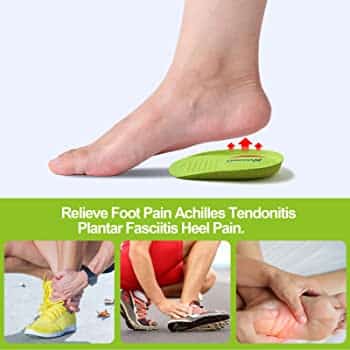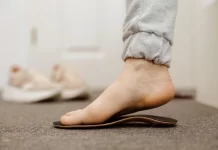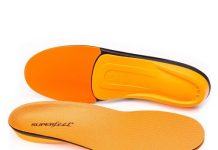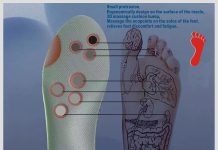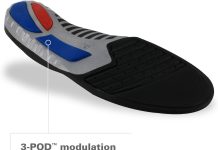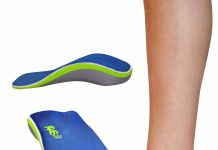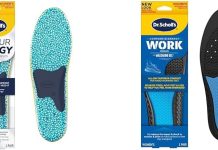Are you experiencing pain and discomfort in your Achilles tendon? You might be suffering from Achilles Tendonitis – a common injury that affects athletes, runners, and even non-athletic individuals.
This condition can cause significant pain, swelling, and stiffness in the affected area. Fortunately, various treatments are available to alleviate the symptoms of Achilles Tendonitis. One of these is using shoe inserts specifically designed for this condition.
In this blog post, we will explore what Achilles Tendonitis is, its causes and symptoms, and provide valuable information on how shoe inserts can help ease the discomfort associated with this condition. So let’s dive right in!
What is Achilles Tendonitis?
Achilles Tendonitis is a condition that occurs when the Achilles tendon, which connects your calf muscles to your heel bone, becomes inflamed. This injury is commonly experienced by athletes who participate in sports that require running and jumping movements. However, it also affects people not involved in any athletic activity.
The Achilles tendon plays a vital role in the movement of our legs as it allows us to walk, run and jump efficiently. When this tendon gets injured or inflamed due to overuse or excessive strain, it can cause significant pain and discomfort.
If left untreated, Achilles Tendonitis can lead to more severe injuries such as a ruptured Achilles tendon – a complete tendon tear requiring surgical intervention.
It’s essential to identify the symptoms of Achilles Tendonitis early on so you can seek treatment right away. You can recover from this condition and prevent further damage or complications with proper care and attention.
Symptoms of Achilles Tendonitis
Achilles Tendonitis is a condition that affects the Achilles tendon, which connects your calf muscles to your heel bone. This condition occurs when the Achilles tendon becomes inflamed or irritated due to overuse or injury.
One of the most common symptoms of Achilles Tendonitis is pain along the back of your leg near your heel. The pain can be mild initially and worsen over time as you use the affected area.
You may also experience stiffness in the affected area, especially in the morning or after prolonged rest periods. In severe cases, swelling and tenderness may also occur around your ankle.
Another symptom of this condition is difficulty walking or standing on tiptoe. You may find it challenging to perform activities requiring pressure on your feet, such as running, jumping, or climbing stairs.
If you experience any of these symptoms for an extended period, seeking medical attention is essential. Early diagnosis and treatment can help prevent further damage and speed up recovery.
Treatment for Achilles Tendonitis
The treatment for Achilles Tendonitis usually depends on the severity of the condition. In mild cases, a combination of rest, ice, and over-the-counter pain relievers may be sufficient to alleviate symptoms. For more severe cases, medical intervention may be necessary.
Physical therapy is often recommended as part of the treatment plan for Achilles Tendonitis. This involves exercises to strengthen the calf muscles and stretch the tendon itself. The goal is to improve flexibility and range of motion while reducing pain.
In some cases, a walking boot or cast may be necessary to immobilize the affected foot and allow time for healing. In rare instances where conservative treatments are ineffective, surgery may be required to repair or remove damaged tissue around the tendon.
It’s important to note that early diagnosis and prompt treatment can prevent further damage to the tendon and speed up recovery time. If you suspect you have Achilles Tendonitis, consult your healthcare provider immediately.
Causes of Achilles Tendonitis
Achilles Tendonitis is a common overuse injury that affects the Achilles tendon – the thick band of tissue connecting the calf muscle to the heel bone. This condition can be caused by several factors, including:
1. Overuse: Repetitive stress on the Achilles tendon from running, jumping, or dancing activities can lead to inflammation and pain.
2. Tight muscles: Tightness in the calf muscles can put extra strain on the Achilles tendon, leading to irritation and inflammation.
3. Incorrect footwear: Wearing shoes with inadequate support or cushioning may cause excessive pressure on your feet, damaging your tendons.
4. Sudden increase in activity level: Increasing intensity levels before allowing enough time for recovery increases the risk of developing this painful condition
5. Anatomical abnormalities: Certain foot shapes or leg lengths may predispose individuals toward developing this condition.
It’s essential to understand what causes Achilles Tendonitis so that you can take preventative measures and reduce your risk of suffering from this painful injury.
How to treat Achilles Tendonitis
Achilles Tendonitis is a common injury that causes pain and stiffness in the Achilles tendon. Left untreated can lead to more severe complications such as ruptures or tears. Here are some ways to treat Achilles Tendonitis:
Rest: Resting your foot is one of the most important things you can do to help heal your Achilles tendon. Avoid high-impact activities and take frequent breaks throughout the day.
Ice: Applying ice to the affected area can help reduce inflammation and relieve pain. Use an ice pack for 15-20 minutes at a time, several times daily.
Compression: Compression bandages or sleeves can help support your ankle and reduce swelling.
Elevation: Elevating your foot above heart level can also help reduce swelling.
Physical Therapy: A physical therapist may recommend exercises to stretch and strengthen your calf muscles, which can alleviate pressure on your Achilles tendon.
Medication: A doctor or pharmacist may recommend over-the-counter pain relievers like ibuprofen or acetaminophen for short-term relief from the pain associated with Achilles Tendonitis.
If you suspect that you have Achilles Tendonitis, it’s essential to seek medical attention immediately. Treatment options vary depending on the injury’s severity, but lifestyle changes such as rest, icing, compression, elevation, and physical therapy are effective methods that aid in healing this condition over time.
Shoe Inserts for Achilles Tendonitis
Shoe Inserts for Achilles Tendonitis offer a great way to reduce pain and promote healing. These inserts help by providing extra cushioning, support, and shock absorption to the affected area. With proper support from shoe inserts, individuals with Achilles Tendonitis can stay active without worrying about further damage.
When looking for the right shoe insert, choosing one that offers good arch support and deep heel cups is essential. Arch supports help distribute pressure evenly across the foot, while deep heel cups provide stability and prevent excess motion in the ankle.
Gel or foam materials are also recommended as they provide additional cushioning and absorb shocks when walking or running. Moreover, choosing an insert designed explicitly for Achilles Tendonitis will target this area of concern.
Ensuring that your shoes fit properly with your chosen inserts installed is crucial. Shoes that are too tight or too loose can cause more harm than good. Also, replace worn-out inserts regularly, as they lose their effectiveness over time.
Using Shoe Inserts for Achilles Tendonitis can be beneficial when dealing with this painful condition, Still, it is essential to pick out ones that offer adequate support and comfort based on individual needs.
How to choose the right shoe insert
When it comes to Achilles tendonitis, choosing the right shoe insert can make a huge difference in your recovery. Here are some tips on how to choose the best one:
1. Consider the material: Shoe inserts come in different materials, such as foam, gel, or silicone. Choose one that provides enough cushioning and support for your foot.
2. Arch support: Look for an insert with proper arch support to help distribute pressure evenly across your foot and reduce stress on your Achilles tendon.
3. Fit: Make sure you get the correct size of shoe insert that fits snugly into your shoes without slipping around inside.
4. Flexibility: A good shoe should be flexible enough to adapt to different types of shoes so you can use them with most footwear in your wardrobe.
5. Breathability: Choose an insert made from breathable material which allows air to flow around your feet, keeping them dry and cool during exercise or any physical activity.
Remember, not all shoe inserts work well for everyone experiencing Achilles tendonitis pain – what works best for someone else might not work for you – so it’s essential to try out a few options until you find what’s comfortable and supportive for you!
Conclusion
Achilles tendonitis can be a painful and debilitating condition that requires proper treatment. While there are many ways to treat this condition, shoe inserts are an effective method that can relieve those suffering from Achilles tendonitis.
When choosing the proper shoe insert for your needs, it’s essential to consider factors like arch support, cushioning, and fit. With so many options available on the market today, doing your research and finding the best option for you will help ensure that you get the most benefit from your shoe inserts.
Always consult a medical professional if you’re experiencing persistent pain or discomfort in your feet or ankles. They can help diagnose any underlying issues and recommend appropriate treatment methods.
With proper care and attention, those suffering from Achilles tendonitis can find relief from their symptoms and get back on their feet again. So don’t let this condition hold you back – take control of your health by investing in high-quality shoe inserts explicitly designed for Achilles tendonitis today!
Skyfoot Orthopedic Heel Lift Inserts, Shock Absorption and Cushioning Height Increase Insoles for Achilles Tendonitis Relief, Heel Spurs, Heel Pain and Plantar Fasciitis (Large - 4/5" Thick)
$12.97 in stock
SQHT Heel Cups for Heel Pain, Heel Inserts for Heel Spurs, Plantar Fasciitis, Achilles Tendonitis Shoe Insert Provide Shock Absorption and Cushioning, 3/4 Shoe Insoles for Men (Men's 8-13)
$12.34 in stock
ProFoot Achilles Tendonitis Men's Orthotic Heel Cup, 1 ea
Dr. Scholl’s HEEL Pain Relief Orthotics // Clinically Proven to Relieve Plantar Fasciitis, Heel Spurs and General Heel Aggravation (for Men's 8-12, also available for Women's 5-12)
Achilles Tendonitis Inserts for Foot Pain Relief by Heel Defender, Immediate Relief for Plantar Fasciitis and Severs Disease, Comfortable 0.4” Sport Small/Medium Shoe Inserts Designed by Podiatrists
Dr. Shoesert Height Increase Insoles, 3-Layer Adjustable Orthopedic Heel Lift Insert for Heel Spurs, Achilles tendonitis, Plantar Fasciitis, 3/4 Length Shock Absorption Cushion Insole (Small)
ProFoot Achilles Tendonitis Women's Orthotic Heel Cup, 1 ea
SQHT's Height Increase Insoles - Heel Shoe Lift Inserts for Achilles Tendonitis and Leg Length Discrepancy, Heel Cushion for Men & Women (Large (0.6" Height))
$12.34 in stock
Omeer 3 Pair Gel Heel Cups For Heel Pain Help Provide Achilles Tendonitis Relief, Plantar Fasciitis Relief, and Bone Spur Pain Relief
Dr.Foot Adjustable Orthopedic Heel Lift Inserts, Height Increase Insole for Leg Length Discrepancies, Heel Spurs, Heel Pain, Sports Injuries, and Achilles tendonitis (Beige, 3 Layers)
Heel Cups Alternative for Plantar Fasciitis by Heel Defender, Achilles Tendonitis Relief, Comfortable Shoe Inserts for Women & Children Designed by Leading Podiatrist to Relieve Foot Pain, Large
$28.90 in stock

